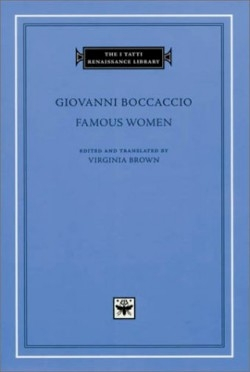Famous Women
Whispered in the language of the dead, tales of 106 famous and infamous women of ancient times breathe new life in this inaugural edition of the Harvard I Tatti Renaissance Library’s Famous Women. Joining Bruni’s History of the Florentine People, which provided the template for all modern works of history, and Ficino’s philosophical Platonic Theology, Giovanni Boccaccio’s book emerges as the earliest amalgam of biographies celebrating and describing the deeds of women exclusively, flushed with the timeless air of antiquity.
A poet and fabler, and author of the celebrated Decameron, Boccaccio here emulates Petrarch, a humanist and personal friend famous for his Lives of Famous Men. Boccaccio, a Renaissance Italian consumed with the reintroduction of Graeco-Roman literature, penned Famous Women in Latin near the end of his days. The result, in its first English translation, bridges the boundaries of language and fosters the perpetual rediscovery of Renaissance intellectualism.
Coupling the Latin text with a faithful English translation on the facing page, the tales average three to five pages each. In a strong narrator’s tone, many of the stories conclude with an ethical summary or moral, which illustrates the Renaissance humanist movement’s effort to infuse the virtues of classical literature into the minds of coming Italian leaders.
Biographies include that of Hippo, a Greek woman who, when captured by pirates, threw herself into the sea in order to remain chaste after learning of their plot to rape her. “At the cost of the few years by which she might have prolonged her life, Hippo ransomed her chastity, exchanging a premature death for everlasting glory.” In contrast, Boccaccio tells the story of Harmonia, a daughter with royal lineage, who, by the design of a nurse, was hidden during an uprising. A young peasant girl, used as a decoy for a murderous mob, remained faithful and refrained from revealing her true identity. Witnessing the girl’s death, Harmonia took her own life and “fell as close as she could to the body of the girl who had preceded her in death.” Leaena, a prostitute, demonstrates a similar stoic heroism, when in an effort to keep silent during torturous interrogation, she “bit down sharply on her tongue, severed it, and spat it out.” Boccaccio reminds readers that “virtue does not scorn anyone who desires it.”
Depicting queens, goddesses, mythological women of Greek and Roman origin, Biblical and post-classical figures, Famous Women provides a fascinating glimpse into distant hearts and minds—successfully bridging the chasms of both time and tongue.
Reviewed by
Karen Wyckoff
Disclosure: This article is not an endorsement, but a review. The publisher of this book provided free copies of the book to have their book reviewed by a professional reviewer. No fee was paid by the publisher for this review. Foreword Reviews only recommends books that we love. Foreword Magazine, Inc. is disclosing this in accordance with the Federal Trade Commission’s 16 CFR, Part 255.

